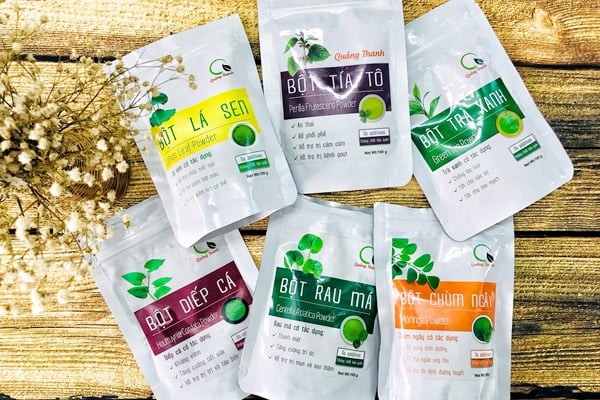May 24, 2025 | 16:19 GMT +7
May 24, 2025 | 16:19 GMT +7
Hotline: 0913.378.918
May 24, 2025 | 16:19 GMT +7
Hotline: 0913.378.918

The packaging design of the vegetable powder products of Viet Nature Co., Ltd. is streamlined with only two colors.
Many unique and high-quality Vietnamese OCOP products are favored by domestic consumers. But in order to reach foreign customers, Vietnam’s OCOP products need to improve in some aspects to promote product value and stay firmly in the market.
As a subject that has been successful in bringing Vietnamese OCOP products to international customers, Ms. Nguyen Ngoc Huong, Director of Viet Nature Import Export Co., Ltd., said: "An OCOP product reaching the international level first must be a product that meets the consumers’ needs. For example, our company’s vegetable powder makes it easy for people to eat vegetables."
According to Ms. Ngoc Huong, in order for Vietnam’s products with quality and indigenous value to create a foothold and increase product value, the first requirement is traceability for food products such as her company's products and stories for handicraft products.
Next are the design requirements, the first element of the product that reaches the consumer. As we integrate into the European market, we need to be aware of packaging trends. The current packaging trend is that the simpler and more streamline the packaging is, the more preferred the product is. The colors printed on the packaging are also streamlined; producers no longer use many colors. Our product packaging currently only has two colors.
Especially when dealing with agricultural products, especially food products, the subjects need to find out the food safety criteria of the countries in which they want to participate. "Our company has a strict working principle that we will not produce products for which we cannot trace the origin, contributing to our stability in the market for many years," said Ms. Nguyen Ngoc Huong.

Ms. Nguyen Ngoc Huong (far right) shared with Vietnam Agriculture News her strict working principle of not producing products for which she cannot trace the origin.
In addition to the product story, indigenous values, packaging, and product quality, in order to bring products to many people, it takes efforts not only from subjects but also from the whole community: departments, branches, consumers, producers, and farmers or input material suppliers in general. Such a chain creates a finished product that has a long-term foothold in the market.
Sharing about necessary local actions in developing OCOP products, Dr. Ngo Thi Thu Trang, Deputy Director of the Saemaul Scientific Advice Council of the University of Social Sciences and Humanities - Vietnam National University Ho Chi Minh City, said, "According to the latest Decision 148 dated February 14, 2013, on the criteria set for rating OCOP products, 3-star OCOP products will be delivered to localities and institutes for evaluation, 4-star products will be brought to the provincial level, and 5-star products will be brought to the central level. So, the first necessary step is that each locality should consider OCOP products a source of pride, not an achievement to chase quantity. Only then will the OCOP program fully realize its true nature."
Furthermore, according to Dr. Ngo Thi Thu Trang, localities should develop support policies for neglected object groups that have not achieved the 3-star OCOP but have the potential to become local brand products with investment. Those are start-up businesses, community enterprises, subjects, and cooperatives; even though they have only achieved 1 or 2 stars, they are still participating in the OCOP program and are making OCOP products.
In addition, in the direction associated with community tourism, we should have policies to rebuild typical products that are being lost and attach them to community tourism. For example, the restoration of Nang Thom Cho Dao rice from Can Duoc, Long An. Only the Cho Dao area can grow such delicious rice. However, with the impact of industrialization and modernization, rice is no longer as delicious as it was in the past due to polluted soil.
Recently, from the central to local levels, there have been active support policies for the OCOP program. For example, in the case of Ms. Thu Huong's company, the company, together with the Department of Agriculture and the People's Committee of Ho Chi Minh City, participated in conferences and meetings to spread the value of OCOP. The People's Committee of Ho Chi Minh City has supported the promotion of OCOP products of enterprises into the Saigon Coop supermarket system nationwide, the Central Food System, and exhibitions connecting Ho Chi Minh City's OCOP products with the Southwest or Southeast provinces.
Not only for domestic promotion but also for international promotion, the Investment Promotion Center of Ho Chi Minh City (ITPC) has also selected typical enterprises, including those with OCOP products that are enterprises of the company. Ms. Thu Huong will participate in the 2023 Food and Beverage Expo in Thailand, which is the largest exhibition in Asia.
However, trade promotion and support policies need to be made more continuous, stronger, more active, and take more specific steps so that OCOP products are not only the pride of the homeland but also to protect businesses, subjects, and the business community in the right direction and protect the trust of consumers.
Translated by Huyen Vu Thu

(VAN) The People's Committee of Tra Vinh province has approved an adjustment to the investment policy for the Green Hydrogen Plant project, increasing its area to approximately 52.76 hectares.
![Reducing emissions from rice fields: [2] Farmers’ commitment to the soil](https://t.ex-cdn.com/nongnghiepmoitruong.vn/608w/files/news/2025/05/05/dsc08881jpg-nongnghiep-140632.jpg)
(VAN) Clean rice cultivation model in Thuong Tan commune, Bac Tan Uyen district, is assisting local residents in achieving sustainable agriculture by substantially reducing costs, increasing productivity, and protecting the environment.

(VAN) At the conference to disseminate Resolution No. 68, AgriS introduced its digital agricultural ecosystem and reaffirmed its commitment to accompanying the Government in promoting private sector development and sustainable agriculture.

(VAN) 'Blue Ocean - Blue Foods' initiative is designed to restore marine ecosystems and establish sustainable livelihoods for local communities by cultivating a minimum of 1,000 hectares of cottonii seaweed in the first three years.
/2025/05/21/4642-3-112707_603.jpg)
(VAN) The V-SCOPE project has made direct contributions to three out of six pillars of the Comprehensive Strategic Partnership between Vietnam and Australia.

(VAN) Facing the threat of rabies spreading to the community, Gia Lai province urgently carries out measures to vaccinate dogs and cats on a large scale.

(VAN) Disease-free livestock farming not only protects livestock herds but also stabilizes production and livelihoods for many farmers in Tuyen Quang.